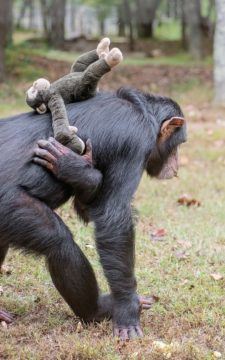Editor’s Note: Frans de Waal’s new book, Different: Gender Through the Eyes of a Primatologist, has generated some controversy and misunderstanding. He will address these issues in a series of short essays which will be published at 3QD and can all be seen in one place here. More comments on these essays can also be seen at Frans de Waal’s Facebook page.
by Frans de Waal

This weekend, the New York Times had an opinion piece by Chelsea Conaboy arguing that the maternal instinct is a myth invented by men.
In a way it’s true, but not in the way the journalist intended.
It is true that we don’t use the term instinct much anymore, certainly not for humans, but also not for other animals. This is because the term suggests that a behavior is simple and automatically comes up in every member of the species, which is rarely true. This applies particularly to maternal care, which is complex behavior and requires example and training. A gorilla female at a zoo who is pregnant and has never watched other mothers care for babies is bound to fail with hers. She has missed opportunities to learn. Her baby is likely to die from starvation or mishandling.
Young female primates are extremely eager to learn, though, and far more attracted to babies and dolls than are males.
They actively seek the maternity training they need. As soon as a mother primate arrives with a newborn she will be surrounded by young females, not males, who all want to hold and cuddle the infant. When these young females grow older, they will turn into babysitters. And when they are adult, they will know what to do with a baby and how to bring it close to their nipples.
The immense female attraction to infants extends to dolls. When experimenters have introduced toys to monkey groups, the movable objects (like balls, cars) ended up with the young males, the plush toys, such as dolls and teddy bears, with the young females. In the wild, young female chimpanzees pick up wooden logs to carry them on their back or belly like an infant. They make their own dolls. Our children are similar. When experimenters have left them alone in a room with an infant, girls show a lot more interest and care than boys.
These examples are described and documented in my book “Different: Gender Through the Eyes of a Primatologist” (Norton, 2022).
In short, maternal skills are learned most eagerly by young females. This is universal in human society, it is something we share with the other primates, and it is entirely logical given that females are and males are not equipped to grow a fetus and nourish it right after birth. This is a mammalian pattern, not invented by men, but evolved two hundred million years ago. It is supported by prolactin, oxytocin, certain brain circuits and of course by physical features that set females apart from males. Nothing mythical about any of this.
This doesn’t mean that every female is maternal, or that maternity is destiny, especially not nowadays with effective birth control. Sex differences are statistically bimodal with overlapping distributions.
It also doesn’t mean that males are incapable of caring for the young. My book describes primate males who end up adopting orphaned youngsters. Often fully adult males, sometimes alpha males, may care for and protect a baby orphan for years. Nice footage can be seen in the Disney documentary: “Chimpanzee.”
In other words, primate males have excellent caring capacities even if they rarely use them in nature. I call it a potential. Nowadays, while society is reshuffling the gender roles within human families, this potential requires attention.
Instead of sweeping human biology under the rug, as the NYT opinion piece tried to do, we should respect it and get to know it better. Biology is far more flexible than most people realize, which is why the “instinct” label is a red herring.
***
 Frans de Waal is a Dutch/American primatologist with a Ph.D. in biology from Utrecht University. In 1981, he moved to the USA to teach at Emory University and direct the Living Links Center for the Study of Ape and Human Evolution, in Atlanta, Georgia. Since 2019, he is Emeritus professor. He is known for his popular books, such as “Chimpanzee Politics” (1982), “Are We Smart Enough to Know How Smart Animals Are?” (2016) and most recently “Different: Gender Through the Eyes of a Primatologist” (2022), which books have been translated into over twenty languages. His interests include animal cooperation, empathy, and the evolution of morality and justice. He has been elected to the (U.S.) National Academy of Sciences and the Royal Netherlands Academy of Arts and Sciences.
Frans de Waal is a Dutch/American primatologist with a Ph.D. in biology from Utrecht University. In 1981, he moved to the USA to teach at Emory University and direct the Living Links Center for the Study of Ape and Human Evolution, in Atlanta, Georgia. Since 2019, he is Emeritus professor. He is known for his popular books, such as “Chimpanzee Politics” (1982), “Are We Smart Enough to Know How Smart Animals Are?” (2016) and most recently “Different: Gender Through the Eyes of a Primatologist” (2022), which books have been translated into over twenty languages. His interests include animal cooperation, empathy, and the evolution of morality and justice. He has been elected to the (U.S.) National Academy of Sciences and the Royal Netherlands Academy of Arts and Sciences.
Also see: http://www.emory.edu/LIVING_LINKS/
